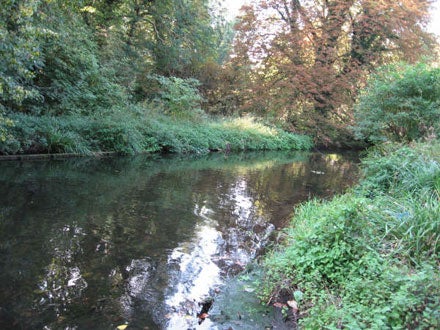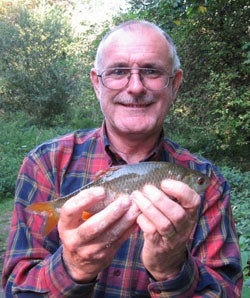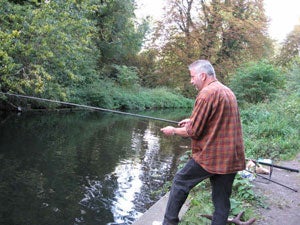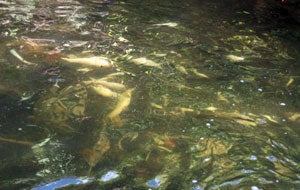Death of the WandleOn Thursday 13th September I fished the Wandle, a showpiece of urban river regeneration, at Morden Hall Park as the guest of Alan Suttie, who can claim a hefty chunk of the credit for bringing the river to life from its former status as a sewer. I enjoyed myself immensely, travelling to and from the river through the London suburbs with my gear on Croydon Tramlink. I caught quite a few fish: roach and small chub, but nothing very big. I had hoped for a further visit soon to the Wandle, with a big roach or chub to show for it – something to boast a little about. But sadly it was not to be…
Black MondayAlan had rung me the day after the pollution had occurred. I went to see the river just below Mill Green in Sutton I saw and spoke to a number of people who happened to be around near the river, near their river as they clearly saw it. Some had witnessed events on that Black Monday. It had by all accounts not been a pretty sight. Seeing so many dead fish clearly moved them; their concerns were also for possible damage to fowl and other wildlife along the river.The river had suddenly turned white and smelly and fish were seen everywhere in acute distress. The estimated time of the pollution was three o’clock in the afternoon, at which time I estimate that I was sitting in front of my computer keyboard at home, at times dreaming, among other things, of my return visit… Devastating chemical spillage, roach over 2lb deadClearly it was a case of a chemical spillage of some kind; possibly chlorine or ammonia. The Environment Agency were on the scene very promptly, but were of course powerless to stop events. I would not wish the experience of seeing the results in the form of fish corpses on anybody. It is devastating. Our lives in what is otherwise an urban wilderness are now so much the poorer. The people I spoke to earlier today are living proof of this. Not every one was an angler, but they were without exception bereft, and very angry.Two skip loads of dead fish are said to have been removed, very quickly, from the Morden Hall area. Mortalities included roach well over two pounds, perhaps touching three, and a dace of a pound and a half.
NUBAWhen I first came across NUBA and got to know Alan Suttie, it became clear to me that NUBA membership did not at all imply that there was no need to be a member of any other angling organisation; quite the reverse in fact. Alan mentioned that he was a member of the Anglers’ Conservation Association and put that organisation at the top of the list for anglers who cared about their sport enough to insure themselves. It was an organisation capable of putting real, telling pressure on polluters. And anglers are thereby seen to be at the forefront of environmental activism, where they by rights belong.The ACA, vital to every anglerLight industry abounds along the banks of the Wandle, and potential sources of serious pollution are many. Even in rural areas, there are numerous disasters and problems which can befall a watercourse. And pollution is only one of the reasons why the services of the ACA are vital to every angler. Do not forget that it is an organisation with environmental expertise, backed up with legal know-how. I have been a life member of the ACA for over twenty years, and have seen the organisation go from strength to strength.In this particular disaster the culprit was, ironically enough, Thames Water’s sewage treatment works at Beddington, just upriver of where I witnessed the effects for myself. What had escaped into the river was highly toxic cleaning fluid used for cleaning screens. Faced with this incontrovertible truth, Thames Water Waste Services have admitted their responsibility and immediately pledged eighty thousand pounds towards restoring the river: far, far short of what is actually needed to repair this virtual wipe-out of river life. The image conscious Thames WaterA quick glance at Thames Water’s website will tell you that it is an image conscious organisation, anxious to show that it is doing its bit, and more, in environmental matters. A report for 2005 says that they, working together with the Environment Agency, pinpointed potential sources of pollution in the Beddington area. The businesses in question, when tackled, had been happy to carry out ‘corrective work’ to their premises. It is just a pity that Thames Water had not put its own house in order at the same time. Instead, it posted a self-congratulatory piece saying it had taken enormous pains to eliminate possible sources of pollution and had thereby ‘successfully cleaned up the Wandle‘.
Now the damage is done. But the matter will not be allowed to rest there. With a will, and more importantly with the right kind of money, rivers can be brought back to life, and the polluting culprits can be hit in their pockets and deterred from repeating their sins. This incident hammered home the message to me that every fishing club, without exception, should belong to the Anglers’ Conservation Association. All else is folly. Club membership of the ACA is no more and no less than a sensible, prudent insurance policy on the future of our sport. We insure our lives, our homes, our prize possessions, and each and every worthwhile asset we possess. So why do so many people not insure their fishing? The last time I checked, it would cost the average fishing club something around one pound per member per year to cover themselves. But so many clubs and societies simply never take out membership. It remains something at the back of their minds, a luxury and a worthy cause which brings no tangible immediate return, but which they will indulge in when they have become a bit more financially secure and can afford it….And the likes of Thames Water Thames Water march on, no doubt in the direction of record future profits. I rest my case. Rod Sturdy (NUBA member & life member of ACA) |
Welcome!Log into your account














